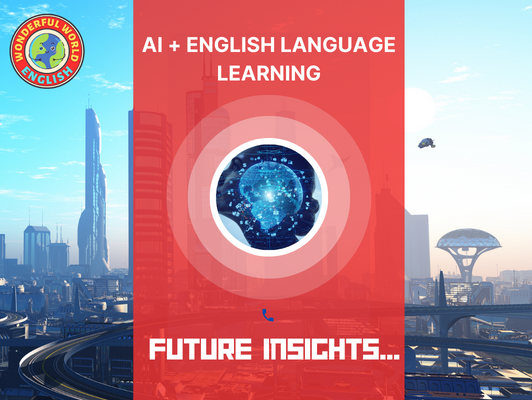Contents
Toggle
Meet David De’ Ath, founder, editor, and writer at Wonderful World English. With his extensive background as an English teacher, David provides valuable insights and practical tips on ESL for students and teachers alike.
The growing field of English language education is undergoing a remarkable transformation, driven by the integration of artificial intelligence (AI) into teaching tools and methods.
AI-powered English Teacher systems are leading this charge, revolutionizing how we learn and teach.
These systems offer customized learning experiences, adapting to each learner’s unique needs.
AI in English education is transforming learning with personalized, technology-driven methods. English Teacher AIs offer tailored, interactive lessons, breaking geographical barriers and enriching the teaching process. Future advancements promise immersive experiences, making learning effective and engaging.
What makes these AI tools so impactful is their ability to enhance the learning experience while introducing a new level of personalization and interactivity.
As these AI technologies continue to evolve, they promise to open up new horizons for students and teachers.
They are making the journey towards English proficiency more accessible, enjoyable, and effective than ever before.
This article will explore the potential future of AI in English language learning based on current trends and insights.
AI and English Language Learning
Integrating AI into English language education is revolutionizing how we approach language learning.
This transformative technology alters teaching methodologies and reshapes the learning experience, making it more personalized, accessible, and efficient.
Of course, the world of AI is rapidly changing, so we cannot say for sure what will happen, but given the current information available, we can explore AI’s potential in language learning.
Whether you’re a teacher or interested in learning languages, you’re in the right place!
Now let’s look at the world of English teacher AI:
1. Exploring the World of English Teacher AI
The advancements in English Teacher AI technologies, particularly in natural language processing and adaptive learning, have significantly improved personalized education.
Intelligent systems now offer features like automated homework grading, which can assess a variety of student assignments, providing scores and suggestions for improvement.
This process is enhanced by learning from historical data and offering real-time feedback.
Another key development is the intelligent tutoring system, which adapts tutoring content and difficulty based on a student’s performance, catering to individual learning habits and needs.
This approach improves learning efficiency and provides comprehensive support across multiple subjects.
On top of this, intelligent speech interaction systems have been integrated, utilizing AI and natural language processing to interact with students, understand their needs, and offer real-time speech assessment.
These systems can recognize speech content and provide answers and suggestions, enhancing students’ oral expression abilities.
These AI-powered systems address key aspects of personalized education, including efficiency, effectiveness, and a focus on individual learning styles, significantly enhancing the quality of education.
For more in-depth information on the advancements in English Teacher AI technologies, such as intelligent homework grading, intelligent tutoring systems, and intelligent speech interaction systems, and their impact on personalized education, click here.

2. Advantages of AI in English Language Education
Integrating AI into English language education offers several great advantages that enhance the overall learning and teaching experience.
One of the key benefits is the improved efficiency in grading and providing feedback.
Automated grading systems powered by AI can swiftly evaluate and grade student work, significantly reducing the time teachers spend on these tasks.
This efficiency allows teachers to focus more on class preparation and student engagement.
These systems also offer objective grading, which reduces the potential for bias or errors, ensuring fair and consistent evaluation of student work.
Another significant advantage is the enhanced quality of teaching through AI-driven feedback tools.
Research led by the Stanford Graduate School of Education found that an automated feedback tool improved instructors’ uptake of student contributions, which is crucial for making students feel heard and linked to greater student achievement.
This tool, leveraging natural language processing, provides consistent, automated feedback, helping teachers improve their teaching practices in a scalable and cost-effective way.
On top of this, AI in English education breaks down geographical limitations, enabling learners worldwide to access quality education anytime.
This accessibility is particularly significant in remote learning or for students in regions with limited educational resources.
AI platforms proficient in diverse tasks, such as grading, detailed feedback, and conversational practice, simulate human-like interactions, making learning more engaging and effective.
The use of English Teacher AI not only makes language learning more accessible but also enhances the teaching process.
It brings a richer educational experience to both students and educators by automating basic educational tasks, thereby liberating human educators to focus on more complex aspects of teaching.
This balance of AI and human input in education creates an enriched, effective, and accessible learning environment.
For our list of the best available AI-powered tools for English language learning, click the link below!
Related Article: Best AI-Powered Tools for Learning English (Top 5)

3. Personalized Learning
As stated in the benefits of AI in English learning, English Teacher AIs are revolutionizing personalized learning in language education.
These intelligent platforms adapt to individual proficiency levels and learning preferences, tracking learning patterns and identifying areas for improvement.
By suggesting specific activities, they strengthen particular language skills, ensuring each student learns at his or her own pace and receives an education experience tailored to his or her needs.
Platforms like Lalia in Singapore exemplify this approach by providing adaptive materials scaled to each learner’s proficiency, focusing on vocabulary, grammar, and communication skills.
Meanwhile, Bamboo Learning uses voice and machine learning technology to help young students develop skills in various subjects, including language arts, through voice recognition and immediate feedback.
These advancements in personalized learning with AI are making education more accessible and effective for learners worldwide.
Chat-GPT has emerged as a wonderful tool for teachers and students everywhere.
The link below is for a complete guide on Chat-GPT in English language education!
Related Article: ChatGPT & English Learning: A Teacher’s Guide

4. Challenges and Considerations
Integrating AI into language learning certainly presents unique challenges and considerations that educators and learners must navigate.
A key challenge is maintaining the balance between AI’s efficiency and human interaction’s irreplaceable value in education.
AI systems can significantly impact learner-instructor interaction in online learning environments, affecting factors like communication, support, and presence, which are crucial for student engagement and learning outcomes.
The learner-instructor interaction is particularly important as it enhances student engagement and fosters a sense of community, which is essential for the continuous usage of online learning platforms.
However, AI systems may affect how this interaction occurs, requiring careful consideration to ensure they are used beneficially.
Another challenge is the lack of authentic human interaction in AI-driven language learning.
While AI offers personalized learning paths and immediate feedback, enhancing engagement and learning outcomes, it cannot provide the nuanced human interaction essential for language acquisition.
This limitation could affect the immersive learning experience and restrict students’ creative learning.
As AI is not yet proficient in natural spoken conversation, its ability to assist in certain language contexts is limited, although this is expected to improve over time.
Privacy and ethical concerns are also significant challenges.
AI-powered language learning platforms also collect vast amounts of user data, raising concerns about data privacy, security breaches, and the ethical use of personal information.
As AI requires more data to function effectively, it’s crucial to implement advanced security systems to protect user data from potential breaches.
Countries are increasingly implementing AI-related laws to ensure AI’s safe and ethical use in daily life.
However, as AI technology develops, these laws will need to evolve to keep pace with technological advancements.

5. The Future of English Learning with AI
The future of English learning with AI is shaping into an incredibly dynamic and engaging field driven by technological advancements.
With Virtual Reality (VR) and Augmented Reality (AR) integration, immersive learning experiences are becoming more accessible and effective.
These technologies are not just adding an element of fun to learning but also enhancing the educational process’s effectiveness.
Studies have shown that learners using AR, VR, and AI are more likely to retain and apply information in practical scenarios.
One of the key aspects of this future is the role of VR in creating immersive language learning environments.
VR has the potential to transform traditional language learning methods by providing interactive experiences that simulate real-world scenarios.
This can be particularly beneficial in overcoming logistical challenges associated with traditional field trips, as VR can transport students to any location virtually, enhancing their learning experience.
Additionally, VR shows promise in addressing the needs of students with learning disabilities, offering tailored interventions and a safe space for practice and reinforcement.
Moreover, integrating AI and speech recognition technologies enhances the interactive aspects of language learning.
These advancements lead to more personalized learning paths, where lessons are tailored to individual learning styles, strengths, and weaknesses.
AI-driven personalization in language learning has reached new heights, with language apps employing machine learning algorithms to provide customized lessons.
Platforms like Mondly by Pearson have made significant progress in this area, introducing features like advanced speech recognition technology and AI conversational partners for a more realistic learning experience.
As we look ahead, the future of immersive education seems bright. The integration of AI and AR into VR experiences will further enhance the interactive and adaptive nature of learning.
Virtual classrooms are evolving into dynamic ecosystems that cater to the individual needs of each learner, making education a truly personalized and engaging journey.
Check out the link below for more insights into VR and English education!
Related Article: VR in English Teaching: The Ultimate Guide

Conclusion
Integrating AI in English language education marks the onset of a transformative era in educational methodologies.
This shift emphasizes personalized learning, making it the new norm. It equips learners globally with innovative tools to master English in ways that align with their unique learning preferences.
The advancements in AI technology are set to continually revolutionize both learning and teaching methods, enhancing the efficacy of language acquisition.
This ongoing evolution in educational practices is significant, representing a major leap forward.
It heralds a future where education is not only more accessible and engaging but also markedly more effective for learners everywhere.
This transformation in English language education through AI is a testament to how technology can profoundly impact and improve our learning, making education a more tailored, immersive, and enriching experience for students worldwide.
As we move forward, it’s clear that these technological advancements in education will continue to evolve, shaping the future of learning in ways we are only beginning to imagine.
We hope you find value in this article.
Have a wonderful day!
Image Attribution: All images licensed via canva.com






